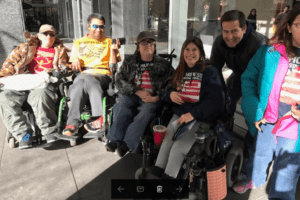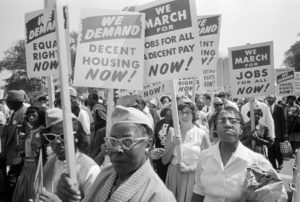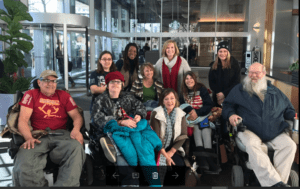Will we have to March for Medicaid?
It is the dawn of a new year and perhaps, a new era. As Martin Luther King’s birthday approached, I had no idea how this would play out within just days of this National Holiday.
Congress is swiftly moving on a new agenda and some say Medicaid will be changed, possibly moving towards Block Grants. Word on the street says that could mean a 50% cut in services for Medicaid recipients in Colorado. In our concern over Mikelle’s future, I realized freedom comes in slowly and can be abrupt in its departure.
The alert from the Colorado Cross-Disability Coalition went out early last week. We need signatures to protect Medicaid. If you can come, join us at Senator Cory Gardner’s downtown Denver’s 17th Street office on the fifth floor at Noon on January 10, 2017. Sign up now. It was now or never. No time to process this one, I told myself.
I remember a time without Medicaid. I was a single working mother of two. For the first eleven years of Mikelle’s young life, we received no Medicaid and our medical insurance refused to pay for any costs relating to her disability. However, Mikelle never went without what she needed to progress in her life. She had a mom who was powerful in her fundraising efforts to pay for wheelchairs, communication devices, and therapies. While many good things came from continual fundraising, it was exhausting.
That is why, on this windy January day, I joined the ranks of mothers and fathers of special needs children, I walked with people with
In all actually, the freedom movement for people with disabilities began on the heels of the civil rights movement for racial equality. It was a movement to free people from institutional care, to free them of abuse and much like the civil rights movement, to open the doors of opportunity.
The march across the bridge in Selma, inspired freedom’s ring in Denver during the 1970’s as people in wheelchairs crawled out onto the cold pavement of a busy street in front of the golden dome of the Colorado state capitol building. One by one, these “Gang of 19” lined up, head to toe, blocking traffic on one of Denver’s busiest streets, protesting the lack of accessible public transportation. These advocates sought freedom of movement and a pathway to opportunity.
Protests have often been the only path to change, and on the eve of Martin Luther King’s birth, I find poetry in protest, I find freedom in our collective voice, and the numbers gathered on January 10th.
We sent emails, phone calls, and now a more personal approach was needed. Our original goal was simply to bring attention to this significant concern. We just wanted a short meeting with one of the Senator’s legislative aides. Congress was in session, moving quickly with its new agenda and we knew the Senator was in Washington, DC attending confirmation hearings for the new administration. Time was growing short; decisions were moving fast. A stroke of a pen and it could all be gone.
A small group of us hoped for the meeting. We assembled in the lobby of the high-rise building. Four “walkies” and two wheelchairs approached the bank of elevators. A petite, powerhouse of a woman with manicured, power-red fingernails reached out to push the button, her hand reluctant with cerebral palsy, pressed firmly the button to the fifth floor. Nothing happened. She did it again, nothing.
“Let me check the stairs,” I said.
“Ok,” said my powerhouse friend. “Maybe we will have to commandeer the elevator.” I reached the 5th floor, and the doors were locked. I took the elevator to the sixth floor, and another group of advocates tumbled out the doors, failing to gain access to the Senator’s office. We concluded; we have been locked out.
All of us reached for our cell phones calling the Senator’s office. I was the first to get through to his receptionist. “Hello. I am with a group of people who would like a few minutes of your time.” I said.
I placed the phone on speaker for all to hear her say, “We have a small office and a group is already up here. I am sorry, we can’t have you up here.”
One of veteran advocates said, “We aren’t going anywhere. Send someone to speak to us.”
Feeling the tone and determination in his voice, she agreed to send someone down to meet with us in the lobby.
Concerned, we reached out to the media and waited.
Eventually, we were met with a gracious staffer. Our brief meeting was productive and important. Our voices heard, our presence felt.
Persistence pays. Our message is clear; nothing about us without us.
In celebration of civil rights, freedom and opportunity for all.
PS. You may have to MARCH FOR MEDICAID. Listed below are some recent articles stating the concern for seniors and people with disabilities in other states.
Medicaid Endanger


